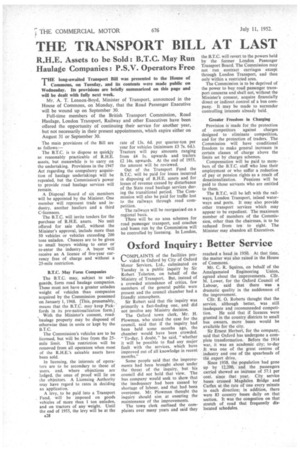Oxford Inquiry : Better Service
Page 30

If you've noticed an error in this article please click here to report it so we can fix it.
rOMPLATNTS of the facilities pro
vided in Oxford by City of Oxford Motor Services, Ltd., culminated on Tuesday in a public inquiry by Sir Robert Tolerton, on behalf of the Ministry of Transport. But, instead of a crowded attendance of critics, few members of the general public were present and the council chamber had a friendly atmosphere. Sir Robert said that tile inquiry was primarily a fact-finding one, and did not involve any Ministry decision. The Oxford town clerk, Mr. H. Plowman, who stated the case for the council, said that if the inquiry had been held some months ago, the chamber would have been crowded. "To-day, I doubt." he said, "whether it will be possible to find any major fault with the services, which have improved out of all knowledge in recent months."
Some people said that the improvements had been brought about under the threat of the inquiry, but his council did not hold that view. The bus company would seek to show that the inadequacy had been caused by shortage of labour, and that had been overcome. Mr. Plowman thought the inquiry should aim at ensuring the maintenance of the improvements.
The towu clerk outlined the complaints over many years and said they reached a head in 1950. At that time, the matter was also raised in the House of Commons.
Mr. C. R. Squires, on behalf of the Amalgamated Engineering Union, agreed about the improvements. Cllr. M. Lower, for the Oxford Council of Labour, said that there was a dramatic quality in the suddenness of the improvement.
Cllr. E. 0. Roberts thought that the service, although better, was still inadequate and recommended competi
tion. He said that if licences were granted in the country districts to small bus owners, more buses would be available for the city.
Sir Ernest Herbert, for the company, said that Oxford has undergone a complete transformation. Before the 1914 war, it was an academic city; to-day It was one of the great centres of industry and one of the spearheads of the export drive.
Since 1938, the population had gone up by 12,200, and the passengers carried showed an increase of 57.1 per cent. since that year. City service buses crossed Magdalen Bridge and Carfax at the rate of one every minute in each direction; in addition, there were 83 country buses daily on that section. It was the congestion on that stretch of road that frequently dislocated schedules.




















































































